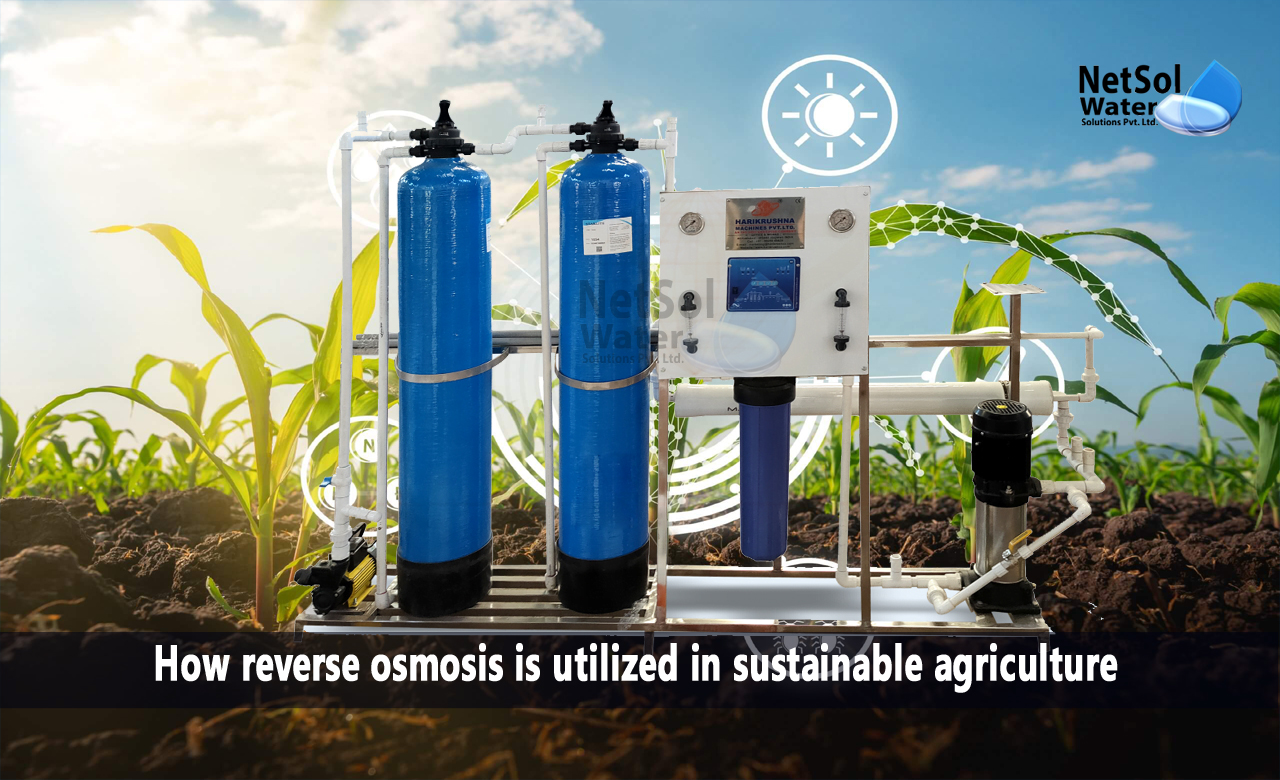Water scarcity is a significant challenge in agriculture, where efficient water management is crucial for sustainable practices. Reverse osmosis (RO) technology has emerged as a valuable tool for improving irrigation water quality and optimizing water use in agriculture. In this blog, we will explore the applications of reverse osmosis in sustainable agriculture, focusing on irrigation water management and its benefits for crop productivity and How reverse osmosis is utilized in sustainable agriculture?
Role of reverse osmosis in sustainable agriculture:
Reverse osmosis aids in the development of sustainable agriculture in the following ways:
1. Water Quality Improvement: Reverse osmosis effectively removes dissolved salts, minerals, contaminants, and pathogens from water, improving its quality for irrigation. By eliminating harmful substances, RO helps prevent soil salinity, which can adversely affect plant growth and yield. High-quality water promotes better nutrient uptake and reduces the risk of plant diseases.
2. Soil Conservation: The use of reverse osmosis-treated water minimizes the accumulation of salts and other contaminants in agricultural soils. Excessive salts can damage soil structure, reduce fertility, and impair crop growth. By preventing soil salinization, RO technology helps maintain soil health and productivity, contributing to sustainable agricultural practices.
3. Water Conservation: Reverse osmosis enables the efficient use of water in agriculture. By removing impurities and optimizing water quality, it allows for the reuse and recycling of treated water, reducing the reliance on freshwater sources. Water conservation is especially crucial in water-scarce regions, where agricultural activities can strain local water supplies.
4. Enhanced Crop Yield and Quality: Improved water quality through reverse osmosis positively impacts crop productivity and quality. High-quality water free from salts and contaminants promotes better nutrient absorption by plants, leading to healthier growth and higher yields. Additionally, RO-treated water reduces the risk of crop damage due to salt stress or the presence of toxic substances.
5. Environmental Sustainability: Sustainable agriculture practices aim to minimize environmental impacts. Reverse osmosis supports this goal by reducing the discharge of polluted water into ecosystems. By treating and reusing water, farmers can contribute to water resource conservation and protect natural habitats from contamination.
6. Long-Term Cost Savings: While implementing reverse osmosis systems may involve upfront costs, they can result in long-term cost savings. Improved water quality reduces the need for soil remediation and the use of chemical inputs to overcome nutrient deficiencies or soil salinity issues. Furthermore, water recycling and conservation can lead to decreased water supply costs, making agricultural operations more economically sustainable.
How reverse osmosis is utilized in sustainable agriculture?
1. Pre-treatment: Before the water enters the reverse osmosis system, pre-treatment processes are applied to remove suspended solids, sediment, and larger contaminants. This step helps protect the reverse osmosis membranes from fouling and enhances their longevity and performance.
2. Pressure application: The pre-treated water is pressurized and forced through a semi-permeable membrane in the reverse osmosis system. The membrane acts as a barrier, allowing water molecules to pass through while rejecting dissolved salts, minerals, and other impurities.
3. Separation of permeate and concentrate: As the water passes through the reverse osmosis membrane, it separates into two streams: permeate and concentrate. The permeate is the purified water that has successfully passed through the membrane, while the concentrate contains the concentrated salts and contaminants.
4. Adjusting water quality: Depending on the specific crop's water requirements, the permeate from the reverse osmosis system can be further adjusted to achieve optimal water quality. This may involve blending the purified water with other water sources or adding essential nutrients to meet crop-specific needs.
Benefits of Reverse Osmosis in Sustainable Agriculture:
a. Improved crop productivity: By treating irrigation water with reverse osmosis, the concentration of dissolved salts and minerals is significantly reduced. This helps prevent soil salinity and improves water uptake by plant roots, leading to enhanced crop productivity, yield, and quality.
b. Water conservation: Reverse osmosis enables the reuse of treated water, reducing the reliance on freshwater sources for irrigation. By conserving water resources, sustainable agriculture practices become more achievable, even in water-scarce regions.
c. Soil and environmental protection: The removal of salts and contaminants from irrigation water through reverse osmosis prevents soil degradation and the accumulation of harmful substances in agricultural land. This contributes to the long-term sustainability of soil health and minimizes environmental impacts, such as groundwater contamination.
d. Cost-effective solution: Although the initial investment in reverse osmosis systems may be significant, the long-term benefits can outweigh the costs. Improved crop productivity, reduced water consumption, and lower soil remediation expenses make reverse osmosis a cost-effective solution for sustainable agriculture.
Opportunities and Challenges:
While reverse osmosis offers significant advantages in irrigation water management, there are challenges to consider. The energy requirements for pressurizing water in the reverse osmosis process should be taken into account, and system maintenance is essential to ensure optimal membrane performance.
In the future, advancements in membrane technology and system design will continue to improve the efficiency and sustainability of reverse osmosis in agriculture. Integration with renewable energy sources and innovative water management strategies will further enhance the overall sustainability of irrigation practices.
Netsol Water is Greater Noida-based leading water & wastewater treatment plant manufacturer. We are industry's most demanding company based on client review and work quality. We are known as best commercial RO plant manufacturers, industrial RO plant manufacturer, sewage treatment plant manufacturer, Water Softener Plant Manufacturers and effluent treatment plant manufacturers. Apart from this 24x7 customer support is our USP. Call on +91-9650608473, or write us at enquiry@netsolwater.com for any support, inquiry or product-purchase related query.



